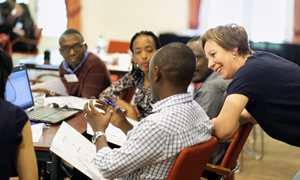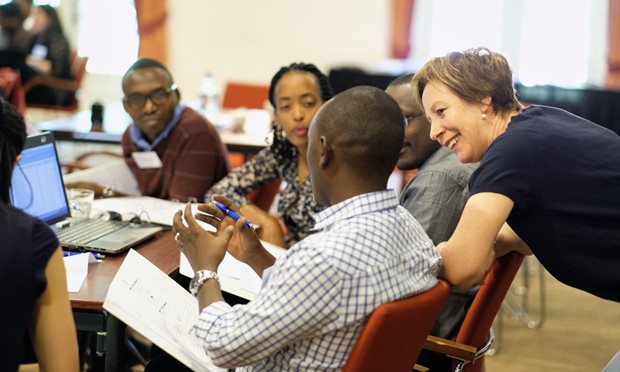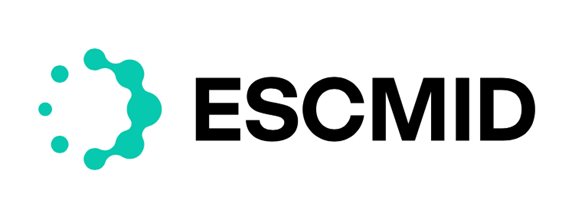

About the Dutch Antimicrobial Stewardship masterclass & expert consultancy
"How to improve antibiotic use: a practical introduction to the development and implementation of Antimicrobial Stewardship Programs." read moreAbout the Dutch Antimicrobial Stewardship masterclass & expert consultancy
“How to improve antibiotic use: a practical introduction to the development and implementation of Antimicrobial Stewardship Programs”
Our goal is to guide professionals and policy makers through the process of developing and implementing a successful Antimicrobial Stewardship Program in their hospital, healthcare system, region or even country. We achieve to do so by preparing you through pre-course online courses and project assignments, by teaching you through a 4-day course and helping you to elaborate your project. After the masterclass a dedicated coach will assist you with the evaluation and refinement of the project.

Endorsed by
This masterclass is endorsed by ESGAP.Contact us

Jeroen Schouten
Intensivist & Senior researcher IQ Healthcare
or
+316 29 12 90 83
contact form

Learning objectives of the course
"This course was probably the most valuable professional experience in the field of AMS that I have had so far." read moreLearning objectives of the course
Learning objectives
- to understand the problems of Antimicrobial Resistance (AMR) across global, national and local levels;
- to understand and be able to describe the core elements of antimicrobial stewardship;
- to understand how to develop local/national guidelines for appropriate antibiotic use, based on international guidelines and local/national resistance levels;
- to be aware of the main barriers to the development of an Antimicrobial Stewardship Program, and to be able to apply improvement strategies to address these;
- to be able to convey the knowledge and skills needed for Antimicrobial Stewardship to both clinical and management teams in hospitals;
- to have decided next steps to take to improve antibiotic use/implement antibiotic stewardship in my health care setting/country.
Why this course?
- The Radboudumc offers small classes, excellent and reknown clinical and implementation scientists as well as tutors, clear learning goals, modern teaching skills, examination and certification.
- The Radboudumc cooperates with other Centers of Excellence in Infectious Diseases exchanging guest professors.
- Participants in 2019 awarded the masterclass a 9.2 (on a scale from 1 to 10).
Why this course?
We offer small classes, excellent and reknown clinical and implementation scientists as well as tutors, clear learning goals, modern teaching skills, examination and certification. Furthermore, we cooperate with other Centers of Excellence in Infectious Diseases exchanging guest professors.
We are ideally placed for groups, responsible for the implementation of an Antimicrobial Stewardship Program, including clinicians (micro, ID, clinical pharmacy) and policymakers.
Participants in 2019 awarded the masterclass a 9.2 (on a scale from 1 to 10).
Tutors of the masterclass
The practical introduction to the development and implementation of Antimicrobial Stewardship Programs is taught by excellent and reknown tutors. read moreTutors of the masterclass
Marlies Hulscher PhD, professor of Quality of Care for infectious diseases
Marlies is a senior researcher at the Scientific Institute for Quality of Healthcare (IQ healthcare) of the Radboud University Medical Center, Nijmegen. IQ healthcare has a multi-disciplinary health services research staff with a background in e.g. sociology, social psychology, humanities, (bio)medical sciences, and economics and management. Marlies has more than 25 years experience in implementation research and behavioral science. Implementation scientists seek to understand the behavior of healthcare professionals and other stakeholders as a key variable in the uptake of evidence-based interventions into routine practice. Such insight into factors that underpin behaviors is crucial so that theories on behavioral change can be selected to generate ideas for the planning of effective interventions to change professional and stakeholder behavior and improve patient health.
As a Principal Investigator Marlies has performed numerous studies on defining, measuring, understanding and improving appropriate hospital antibiotic use and infection prevention. She is experienced in qualitative and quantitative research and in effect, process and economic evaluations.
Read more about Marlies or visit the Dutch Antimicrobial Stewardship team page.
Heiman Wertheim, professor in clinical microbiology
Heiman is clinical microbiologist and heads the clinical microbiology department at Radboud University Medical Center. He is board member for the Nederlandse Vereniging voor Medische Microbiologie (NVMM) and member of the ‘Raad voor Wetenschap en Innovatie’ at the Federatie Medisch Specialisten.
One of his main interests is antibiotic resistance in both resource rich and resource constrained settings and does this through a multidisciplinary approach: health systems, policy development, behavior, surveillance, prevention, genomics, stewardship and clinical trials. Heiman is currently part of a WHO expert panel to develop a priority pathogens list (PPL) for antimicrobial resistant bacteria.
Read more about Heiman or visit the Dutch Antimicrobial Stewardship team page.
Jaap ten Oever MD PhD, infectious disease physician
Jaap’s interest are community- and hospital-acquired infections and antimicrobial stewardship, in which he has extensive hands-on experience, is involved in research and policy-making. He was trained as an infectious disease specialist at the Radboud university medical center and obtained his PhD in 2014 with his thesis “Footprints of infections novel diagnostic strategies in infectious diseases”. Besides being a member of the Radboud university medical center antimicrobial stewardship team, he participates in the antibiotic resistance & infection prevention network Gelderland (GAIN), is secretary of the Dutch working Party on Antibiotic Policy (SWAB) working group on antimicrobial stewardship, and a board member of the SWAB. He coordinates the development and implementation of the Dutch antimicrobial stewardship monitor. He is the vice-coordinator of the infectious diseases training program.
Read more about Jaap or visit the Dutch Antimicrobial Stewardship team page.
Jeroen Schouten MD PhD, intensivist and senior researcher
Jeroen is an intensivist at Radboud University Medical Center in Nijmegen and is a senior researcher at IQ healthcare. Jeroen earned a PhD in Infectious Diseases and Implementation Science and has been involved in qualitative research with a focus on antimicrobial stewardship ever since, focusing on its application in Intensive care medicine. As senior researcher, Jeroen has performed numerous studies on understanding and improving hospital antibiotic use. He is experienced in qualitative and quantitative research methods and has been involved in many (inter)national initiatives to improve antibiotic prescribing (e.g. SWAB, ECCMID, ECDC, WHO).
Read more about Jeroen or visit the Dutch Antimicrobial Stewardship team page.
Training locations and completed trainings
Read more about the current AMS training locations and completed trainings.
read moreSpecial programs
Drive-AMS in EU
A EU4Health funded project for data-driven implementation of a behavioural antimicrobial stewardship approach with expert consultancy for appropriate antimicrobial use in Europe (2022-2025).
read moreDrive-AMS in EU
-
The general objective of the drive-AMS project is to reduce inappropriate antimicrobial use resulting in antimicrobial resistance (AMR) in healthcare (hospital and long-term care) facilities through supporting effective implementation of Antimicrobial Stewardship (AMS) interventions using a step-wise behavioural change approach. This objective will contribute to the European and national targets for reducing inappropriate antimicrobial use and tackling AMR.
The specific objectives are:
- Build capacity for AMS implementation by training national experts (Train-the-trainer approach) using the AMS behavioural approach and establishing four national hubs for capacity building in AMS, resulting in at least 30 trained national trainers.
- Enable regular performance of Global-PPS at facility level, to inform AMS teams on the prevalence and quality of antimicrobial prescribing, driving development of targeted AMS interventions; provide specific skills for conducting and analysing a PPS, in at least 64 facilities.
- Provide training and expert consultancy based on the Global-PPS real-time feedback reporting and the DRIVE-AMS course, tailor-made to country-specific health systems and context to at least 256 persons in 64 facilities.
- Empower professionals, by establishing a European registry for expert consultancy and an AMS Alumni Support Network for continuous support between healthcare facilities and cross-collaboration of countries, with over 300 professionals from at least 20 EU member states.
-
The drive-AMS consortium comprises higher-education institutions from six EU member states: Radboudumc (the Netherlands), as the main applicant and five partners: University of Antwerp (Belgium) as knowledge partner, Aristotle University of Thessaloniki (Greece), Higienos Institutas (Lithuania), Centro Hospitalar Universitário de São João (Portugal), and Universitatea de Medicina si Farmacie Iuliu Hatieganu Cluj-Napoca (Romania) as implementing partners.
-
The Netherlands, Belgium, Greece, Lithuania, Portugal, Romania
-
Activities are envisaged through 6 work packages:
- WP 1: Project management and coordination
- WP 2: Measurement and surveillance skills
- WP 3: Capacity building for contextualized AMS implementation course in beneficiary countries
- WP 4: Upscaling expertise and skillset for contextualized AMS implementation
- WP 5: Provision of post-course implementation support
- WP 6: AMS Alumni Support Network
-
1 November 2022 – 31 October 2025
-
Total budget: 1,267,464.22 EUR
drive-AMS is co-funded by the European Health and Digital Executive Agency through EU4H programme under grant agreement No 101079985
Drive-AMS in Low- and Middle Income Countries
The overall aim of the drive-AMS LMICs project is to ensure sustainable and long-term capacity in LMICs for Antimicrobial Stewardship in human health with a One-Health perspective and applicability.
read moreDrive-AMS in Low- and Middle Income Countries
-
Despite limited resources, most LMICs are trying to address AMR in the health sector through evidence-based strategies such as setting up of antimicrobial stewardship programs (AMS).
Setting up sustainable AMS programs requires good training on determinants of antibiotic use and behaviour change techniques, practical skills on how to implement AMS interventions and expert support for successful implementation of chosen interventions.The overall aim of the drive-AMS LMICs project is to ensure sustainable and long-term capacity in LMICs for Antimicrobial Stewardship in human health with a One-Health perspective and applicability.
The AMS masterclass & SPICE expert consultancy (drive-AMS) is an implementation program with expert consultancy support through the Specialized Programme on Infectious Disease Care Everywhere (SPICE) expert registry. The goal of drive-AMS LMICs is to guide professionals and policy makers through the process of developing and implementing a successful AMS program in their hospital, healthcare system, region or country.
-
International Centre for Antimicrobial Solutions (ICARS)
-
The Netherlands, Tanzania, Zambia, Kenya
-
This project aims to provide sustainable solutions through following activities:
- Providing training and teaching tools adapted to the LMICs context, transposing best practices from resource-rich to resource-constrained settings for AMS;
- Building sustainable in-country capacity for delivery of contextualized courses in AMS, that are accredited, of high quality and affordable for the national economy and circumstances;
- Ensuring structured and cost-effective expert support for implementation of AMS through building registry of existing experts in the country and region in specific areas of AMS (SPICE LMICs registry).
-
1 January 2023 – 31 December 2025
-
Total budget: 450,000 EUR
ICARS funding: 300,000 EUR
Radboudumc finding: 150,000 EUR
Masterclass: IPC-track
To prevent the development and spread of resistant pathogens in healthcare settings, antimicrobial stewardship and infection prevention & control go hand-in-hand.
We are currently preparing the integration of an Infection Prevention and Control (IPC)-track within the Antimicrobial Stewardship Masterclass program.
Masterclass: IPC-track
-
We are currently preparing the integration of an Infection Prevention and Control (IPC)-track within the Antimicrobial Stewardship Masterclass program.
To prevent the development and spread of resistant pathogens in healthcare settings, antimicrobial stewardship and infection prevention & control go hand-in-hand. Therefore, an IPC-track will be integrated into this Masterclass program. The target audience for this track consists of medical doctors, nurses, and IPC-experts working in a hospital setting, who have affinity and/or responsibility for Infection Prevention and Control at their workplace.
-
TBA
-
The tryout was conducted in Suriname in 2022, drawing lessons for the most optimal approach to integrating the IPC-track into the AMS masterclass & expert consultancy program.
-
Own funding
ESCMID-AMS Certificate program Basic course
The ESCMID-AMS Certificate is an exciting two-year programme for early-career healthcare professionals. Our Masterclass as the basic course of the program, delves into the intricate workings of antimicrobial stewardship (AMS), focusing on the "what" and "how" to effectively manage antimicrobial therapy.
read moreESCMID-AMS Certificate program Basic course

-
ESCMID-AMS Certificate is organized by ESCMID, combining expertise from courses delivered by different academic and research institutions from
Its Secretariat is hosted by the AMS Program at Radboud University Medical Centre, Nijmegen, the Netherlands.
-
Click here to view the program.
-
Various locations across Europe, both on site as well as online.
-
2-year program
SPICE: Expert Registry
The Specialized Program for Infectious Disease Care Everywhere (SPICE) is an expert registry for providing expert consultancy and support matched to the need of healthcare sector in LMICs to ensure standardized and integrated infectious diseases (ID) care.
read more-
Marlies Hulscher professor IQ healthcare
-
Jaap ten Oever internist
-
Heiman Wertheim arts-microbioloog/ afdelingshoofd



